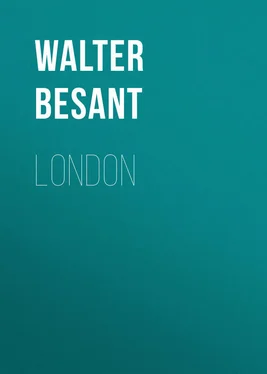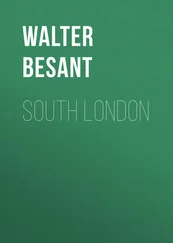Walter Besant - London
Здесь есть возможность читать онлайн «Walter Besant - London» — ознакомительный отрывок электронной книги совершенно бесплатно, а после прочтения отрывка купить полную версию. В некоторых случаях можно слушать аудио, скачать через торрент в формате fb2 и присутствует краткое содержание. Жанр: foreign_antique, foreign_prose, на английском языке. Описание произведения, (предисловие) а так же отзывы посетителей доступны на портале библиотеки ЛибКат.
- Название:London
- Автор:
- Жанр:
- Год:неизвестен
- ISBN:нет данных
- Рейтинг книги:4 / 5. Голосов: 1
-
Избранное:Добавить в избранное
- Отзывы:
-
Ваша оценка:
- 80
- 1
- 2
- 3
- 4
- 5
London: краткое содержание, описание и аннотация
Предлагаем к чтению аннотацию, описание, краткое содержание или предисловие (зависит от того, что написал сам автор книги «London»). Если вы не нашли необходимую информацию о книге — напишите в комментариях, мы постараемся отыскать её.
London — читать онлайн ознакомительный отрывок
Ниже представлен текст книги, разбитый по страницам. Система сохранения места последней прочитанной страницы, позволяет с удобством читать онлайн бесплатно книгу «London», без необходимости каждый раз заново искать на чём Вы остановились. Поставьте закладку, и сможете в любой момент перейти на страницу, на которой закончили чтение.
Интервал:
Закладка:
By this time nothing remained of the old houses but their walls, and these, disintegrated by frost and rain, were mostly ready to fall; the gardens of the villas, the beautiful gardens in which their owners took so much delight, were choked and overgrown with nettles and brambles; the mosaic pavements were covered up with rubbish and mould.
How long did this go on? For fifty years or more. The rude survivors of Augusta and their children lived neglected and forgotten, like the Arabs in the ruins of Palmyra. Outside they knew that a fierce enemy roamed the country; sometimes they could see a band of them on the southern bank gazing curiously at the silent and deserted walls of the City. But these warriors cared nothing for cities, and shuddered, suspecting magic at the sight of the gray wall, and went away again.
One day, however, because nothing remains always undiscovered, there came along the great Vicinal Way so tough and strong, on which the tooth of Time gnawed in vain, a troop of East Saxons. They were an offshoot, a late arrival, a small colony looking about if haply they could find or conquer a convenient place of settlement not yet held by their own people. They marched along the road, and presently saw before them the gray walls of the City, with its gates and bastions. It was a city of which they had heard – once full of people, now, like so many others, a waste chester. It was of no use to them; they wanted a place convenient for farming, not a place encumbered with ruins of houses; a place where they could set up their village community and grow their crops and keep their cattle. The first rush and fury of battle were now over. The East Saxons were at peace, the enemy being either driven away or killed. A single generation of comfort and prosperity had made the people milder in temper. They desired no longer to fight and slay. What, however, if they were to visit the City?
The gate was closed. They blew their horns and called upon the people, if there were any, to surrender. There was no answer. No arrow was shot from the walls, not a stone was thrown, not a head was seen upon the bastion. Then they plied their axes upon the crumbling wood until the gate gave way and fell backward with a crash. Shouting, the men of Essex ran forward. But they soon ceased to shout. Within they found a deserted city; the walls of what had been stately villas stood in broad gardens, but the houses were roofless, the pictured pavements were broken or covered up, the fountains were choked, the walls were tottering. The astonished warriors pressed forward. The ruined villas gave way to crumbling remains of smaller houses standing close together. The streets showed signs of traffic in deep ruts worn by the cart-wheels. Grass grew between the stones. Here and there stood buildings larger than the houses; they, too, were roofless, but over the lintels were carved certain curious emblems – crosses and palm-branches, lambs, vine leaves, and even fish – the meaning of which they understood not. Then the men reached the river-side. Here there had also been a wall, but much of it was broken down; and here they found certain circular huts thatched. Within, the fire was still burning in the middle of the hut. There were signs of hurried departure – the fish was still in the frying-pan, the bed of dried leaves still warm. Where were the people?
They were gone. They had fled in affright. When they heard the shouts of the Saxons, they gathered together their weapons and such things as they could carry, and they fled. They passed out by the gate of that road which their conquerors afterwards called Watling Street. Outside the City they turned northward, and plunged for safety into the pathless forest, whither the enemy would not follow.
When these Saxons found that the walled area contained nothing that was of the least use to them they simply went away. They left it quite alone, as they left the places which they called Pevensey, Silchester, Porchester, and Richborough, and as they left many other waste chesters.
Then Augusta lay silent and dead for a space.
Presently the fugitives crept back and resumed their old life among the ruins and died peacefully, and were followed by their children.
How, then, did London get settled again?
The times became peaceful: the tide of warfare rolled westward; there were no more ships crossing with fresh invaders; there were no more pirates hovering about the broad reaches of the Lower Thames. The country round London on all sides – north, south, east, and west – was settled and in tranquillity. The river was safe. Then a few merchants, finding that the way was open, timidly ventured up the river with wares such as might tempt those fair-haired savages. They went to the port of which the memory survived. No one disputed with them the possession of the grass-grown quays; there were no people, there was no market, there were no buyers. They then sent messengers to the nearest settlements; these – the first commercial travellers, the first gentlemen of the road – showed spear-heads of the finest, swords of the stoutest, beautiful helmets and fine shields, all to be had in exchange for wool and hides. The people learned to trade, and London began to revive. The rustics saw things that tempted them; new wants, new desires were created in their minds. Some of them went into the town and admired its life, how busy it was, how full of companionship; and they thought with pity of the quiet country life and the long days all alone in the fields; they desired to stay there; others saw the beauty of the arts, and were attracted by natural aptitude to learn and practise them. Others, quicker witted than the rest, perceived how by trade a man may live without his own handiwork and by the labor of his brother man. No discovery ever was made more important to the world than this great fact. "You, my brother," said this discoverer, "shall continue to dig and to toil, in hot weather or cold; your limbs shall stiffen and your back shall be bent; I, for my part, will take your work and sell it in places where it is wanted. My shoulders will not grow round, nor will my back be bent. On the contrary, I shall walk jocund and erect, with a laughing eye and a dancing leg, when you are long past laugh or saraband. It is an excellent division of labor. To me the market, where I shall sit at ease chaffering with my wares and jesting with my fellows and feasting at night. To you the plough and the sickle and the flail. An excellent division."
Then more merchants came, and yet more merchants, and the people began to flock in from the country as they do now; and London – Augusta being dead – set her children to work, making some rich, for an example and a stimulus – else no one would work – and keeping the many poor – else there would be no chance for the few to get rich. And she has kept them at work ever since. So that it came to pass when Bishop Mellitus, first of the bishops of London, came to his diocese in the year 604, he found it once more a market and a port with a goodly trade and a crowd of ships and a new people, proud, turbulent, and independent.
So began and so grew modern London.
To the old Rome it owes nothing, not so much as a tradition. Later, when another kind of influence began, London learned much and took much from Rome; but from Augusta – from Roman London – nothing. Roman traditions, Roman speech, Roman superstitions linger yet among the southern Spaniards, though the Moor conquered and held the country for six hundred years. They linger, in spite of many conquests, in France, in Italy (north and south), in Roumania, in Anatolia. In London alone, of all the places which Imperial Rome made her own, and kept for hundreds of years, no trace of ancient Rome remains. When London next hears of the Eternal City it is Rome of the Christian Church.
Читать дальшеИнтервал:
Закладка:
Похожие книги на «London»
Представляем Вашему вниманию похожие книги на «London» списком для выбора. Мы отобрали схожую по названию и смыслу литературу в надежде предоставить читателям больше вариантов отыскать новые, интересные, ещё непрочитанные произведения.
Обсуждение, отзывы о книге «London» и просто собственные мнения читателей. Оставьте ваши комментарии, напишите, что Вы думаете о произведении, его смысле или главных героях. Укажите что конкретно понравилось, а что нет, и почему Вы так считаете.












